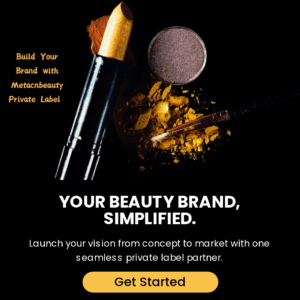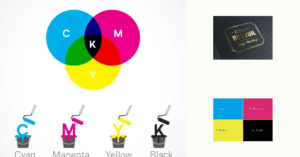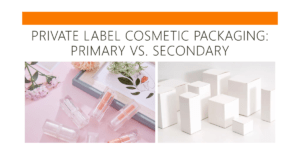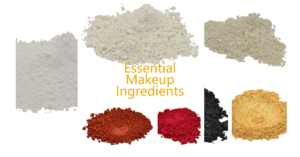Ultimate Guide To Private Label Cosmetics ?
Table of Contents
Private label cosmetics ?
Have you ever dreamed of creating your own cosmetic line? With the rise of cosmetics private label , this dream is more achievable than ever before. In this article, we’ll dive into the world of cosmetics private label , exploring what they are, their benefits, and how you can start your own line.
Advantages of private label products
Private label products have gained popularity over the years due to their ability to offer retailers increased control over product specifications, packaging, and branding. This level of customization allows for unique, exclusive products that can help set a brand apart from its competition.
Some of these advantages include:
Marketing benefits: Private label products can help businesses build their brands .
Cost-effectiveness: Private label products can be more cost-effective for businesses .
Higher stability: Retailers usually depend heavily on product stability to keep their businesses running .
Control over pricing and profitability: Private label products allow businesses to have more control over pricing and profitability .
Adaptability: Private label products can be adapted to meet changing market demands .
Market growth
According to statista :In 2022, the global cosmetics market experienced growth of over 16 percent in comparison to the previous year. Skincare, haircare, make-up, perfumes, toiletries and deodorants, and oral cosmetics are the main product categories of the cosmetics market. Skincare was the leading category in 2021, accounting for about 41 percent of the global market. Haircare products made up a further 22 percent, while make-up accounted for approximately 16 percent.and the global private label market is booming, with a projected CAGR of 4.4% from 2021 to 2028. This growth is driven by increasing consumer acceptance and the desire for more affordable, high-quality products.
What Are Private Label Cosmetics?
Definition and examples
Private label cosmetics are beauty and personal care products that are manufactured by a third-party manufacturer for retailers. These products may be sold under the retailer’s name or a unique brand created exclusively for the retailer . As a consumer, you get to choose everything about the product, including the product’s packaging, its formula, and the design of the label, simply words to say ( Are products manufactured by a third-party company but sold under a retailer’s brand name). Some examples of private label cosmetic brands include Trader Joe’s, Target’s “Good Chemistry,” and Amazon’s “Find.” ,Here are top 10 Private Label Cosmetics Manufacturers such as Metacnbeauty Private label cosmetics, Audrey Morris Cosmetics International.
Types of private label cosmetics
cosmetics private label can range from skincare, makeup, and hair care to fragrances and beauty accessories. There are no limits to the variety of products that can be developed under a private label cosmetic company.These products are manufactured for retailers and may be sold under the retailer’s name or a unique brand created exclusively for the retailer.
Benefits of Private Label Cosmetics
Customization and uniqueness
One of the most significant advantages of that is the ability to create unique, customized products. Retailers can work closely with manufacturers to develop specific formulations, colors, and packaging designs that reflect their brand identity.
Profit margins
Private label cosmetics typically have higher profit margins compared to branded products. This is because retailers can cut out the middleman and set their own pricing, allowing them to maintain better control over their costs.It generally cost less than their branded counterparts .
Brand control and loyalty
Brand Recognition: Private label cosmetics allow companies to create a recognizable brand identity that will stand out on store shelves and be remembered by customers. This can help to increase sales and build customer loyalty .and by offering exclusive, high-quality products, retailers can build brand loyalty among their customers. Its allow retailers to differentiate themselves from competitors and create a memorable shopping experience for their clientele.
Distribution
Private label cosmetics are typically more widely available than their branded counterparts, allowing for greater reach to potential customers
Choosing a Private Label Manufacturer
Research and evaluate
When choosing a private label manufacturer, it is important to look for a company with a proven track record of quality and reliability. The manufacturer should have a strong reputation in the industry and be able to provide references and testimonials from other satisfied customers.
It’s crucial to research and evaluate potential manufacturers carefully. Look for companies with a solid reputation, extensive experience, and a diverse portfolio of products.
Quality and certifications
Product quality is also an important aspect to consider when choosing a manufacturer. Ensure you get samples tested before making a deal and confirm the color, size, dimensions, and style of the product they offer and the modifications you need and that the manufacturer maintains strict quality control standards and holds relevant certifications, such as GMP, ISO, or FDA registrations. This ensures that your products will be of high quality and comply with industry regulations.
Minimum order quantity and lead times
The minimum order quantity (MOQ) and lead times for private label cosmetic companies can vary depending on the manufacturer. For example, Company like Metacnbeauty doesn’t require large minimum order quantities and has a 6000 unit minimum order on stock formulas and a 10000 unit minimum on custom formulas ,some item which are pre-made ,very mature formula and often mass-produced that MOQ can be start from 100 unit, the lead time of about 7 to 10 days ,if based on standard blank packaging products and standard formulations . if based on development formular .,Ariel Cosmetic has an average lead time of about 30 to 45 days even more days for customized private labels .
It is important to research and compare different manufacturers to find one that meets your specific needs.
Consider the manufacturer’s minimum order quantity (MOQ) and lead times. Choose a manufacturer that aligns with your budget and can meet your desired production timelines.
How To Developing And Sell Your Private Label Cosmetic Line in 7 Steps
1.Find a Niche
To create a successful high quality private label cosmetics line, you must first identify your target Niche market. It’s possible to have a profitable private label line with a few individual products. However, the best way to sell private label cosmetics successfully is by finding a niche and building a product line around a certain category or interest.
A cohesive product line will help develop a strong brand and target a specific audience.
In addition to product sourcing, your niche will inform many aspects of your branding and advertising. Thrive Causemetics advertises its vegan formulations all over its site—including in its brand name.
Popular cosmetics niches include:
Private label natural cosmetics
Private label vegan cosmetics
Organic cosmetics
Cannabidiol (CBD) cosmetics and skin care
Sustainable and environmentally friendly cosmetics
Anti-aging cosmetics
Paraben-free cosmetics
“Clean beauty” cosmetics
Clean Beauty is a consumer trend that’s quickly growing in popularity. Qualifying products are non-toxic and free from potentially harmful ingredients, such as parabens, sulfates, phthalates, and/or artificial colors and fragrances.
The clean beauty market was worth $7.22 billion globally in 2022, and is expected to reach $14.36 billion by 2028—outpacing the overall cosmetics category in growth.
2.Identify Profitable Products
The Second step in starting a successful private label cosmetic line is ensuring there’s high consumer demand for the products you want to sell. Use tools like Google Trends and pages on Amazon like the Best Sellers list and Movers and Shakers. When used together, these tools can give you a clear picture of whether or not people are searching for and buying the types of cosmetics you want to sell.
Google Trends: Google Trends shows you whether searches for a particular keyword are increasing or decreasing, and how much general interest there is for that term.
Amazon Best Sellers list: Amazon’s Best Sellers list can be narrowed down into any product category or subcategory so you can see what cosmetics are most popular and get a feel for the current competition.
Amazon Movers and Shakers: This list shows products experiencing sudden growth or popularity, which helps spot trends.
Visiting boutiques and other retailers: See what other retailers are featuring in-store and even check the packaging to get ideas for potential suppliers. Keep in mind, the most popular brick-and-mortar places for women to buy cosmetics include drugstores, mass merchandisers, and department stores, so it’s a good idea to check out those spots.
Once you’ve identified your Niche market, choose products that cater to their specific needs and preferences.
3.Search custom private label cosmetics suppliers
There are two primary ways you can source products for your private label cosmetics company: online or in person at beauty industry trade shows.
Before you start looking at suppliers, refer to your chosen niche to define exactly what you want in your private label cosmetics line. For example, do you want only organic products? Do you need skin care products, makeup, or both? Are there specific ingredients you want or don’t want?
It’s important to consider consumer preferences to avoid unnatural ingredients and chemicals that may turn potential buyers off.
You’ll also want to vet your suppliers to make sure they can be a compatible and profitable business partner. Here are a few more questions to consider when researching private label cosmetics suppliers:
Are they compliant with Food and Drug Administration (FDA) guidelines or In Europe, cosmetics are regulated by the European Commission under Regulation (EC) No 1223/2009 on cosmetic products. This regulation sets out the rules for the composition, labeling, and packaging of cosmetic products sold in the European Union . It is important for companies to ensure that their cosmetic products comply with the regulations of the countries in which they are sold?
Are their products made using materials produced domestically or sourced overseas?
Do they print labels and packaging for you? What level of customization is offered?
What are the order minimums?
What are the label and packaging fees?
What is the turnaround time for new orders and reorders?
How are their online reviews from other customers?
A.Ensure Products Adhere to Regulations
In your online research you’ll undoubtedly find suppliers based overseas, especially in China. Not only these suppliers may offer lower pricing, but also imported cosmetics meet US requirements and other legal standards. Going this route could be your first choice ,With much more low cost and competivive ,like so many US , Canada ,EU ,AUS, based cosmetics brands, there’s no reason to take this chance.
(Pro tip:Selling a product under your brand name makes you legally liable for it— regardless of who manufactured it.)
B.Finding Suppliers Online
One of the easiest ways to start finding private label cosmetics companies suppliers is by searching for “private label cosmetics in China ” ,”the best private label cosmetics” or “top private label cosmetics”on Google. This search gives you a long list of suppliers to start with.
Visit a few supplier websites and you’ll see that most cover the full spectrum of private label cosmetics, from customizable makeup programs to full skincare lines. Most suppliers offer a huge assortment so you can mix and match products to craft a unique and complete beauty products line.
Most supplier websites also give you insight into how their ordering process works. Many suppliers even list very low minimum order requirements. So, depending on the range of products you want to start with, it’s quite possible to launch your own beauty brand for just a few hundred dollars using private label cosmetics.
You can refine your Google search further for specific requirements on your must-have list by including terms like natural, organic, and cruelty-free in the search box. Include whatever terms you require to define your own unique beauty brand.
Some popular online cosmetics manufacturers and suppliers include:
Metacnbeauty, Oxona, Nardo Naturals
Modern Basic,Mineral Mine. Pinnacle Cosmetics.
Lady Burd ,Radical Cosmetics, Audrey Morris
ByrdieMany, Indigo ,Dynamic Blending
Metacnebauty Private Label Cosmetics is popular supplier in China that offers customization options, like the multiple logo layouts shown above.
C.Finding Suppliers at Trade Shows
Beauty industry trade shows are an excellent way to meet many private label suppliers in one convenient location. At these shows, you can get hands-on experience with a wide variety of products and even leave with plenty of free and low-cost samples to review. Best of all, trade shows let you discuss your goals with potential suppliers in person and develop a relationship.
Cosmoprof is one of the most popular beauty trade shows. It’s also great for small businesses because it features suppliers of all types and sizes, including new brands and manufacturers. It also has specific sections dedicated to environmentally friendly products and startup companies. Plus, there are plenty of activities and networking opportunities.
Other popular trade shows include:
International Beauty Show
International Salon & Spa Expo
Indie Beauty Expo
Private Label World Expo
Premiere Orlando
Showing a cosmoprof event in North America, Las Vegas.
Cosmoprof North America Las Vegas is held once per year and caters to beauty retailers, professionals, and influencers of all sizes.
If you decide to attend a trade show, look up the show organizers on Google and contact them to make sure you have the correct credentials for entry. Most merchandise trade shows are free to attend for qualified retail buyers. Some require just your state sales tax number while others need proof of an existing online or physical business. It’s best to find out ahead of time to make sure you’ll be admitted.
4.Request Samples & Review Products
Most private label cosmetics suppliers offer low-cost sample kits or single samples. In general, expect to pay between $50 to $150 per company to have samples shipped to you. Going this route costs money but gives you the crucial chance to check out products in person—making it worth the investment.
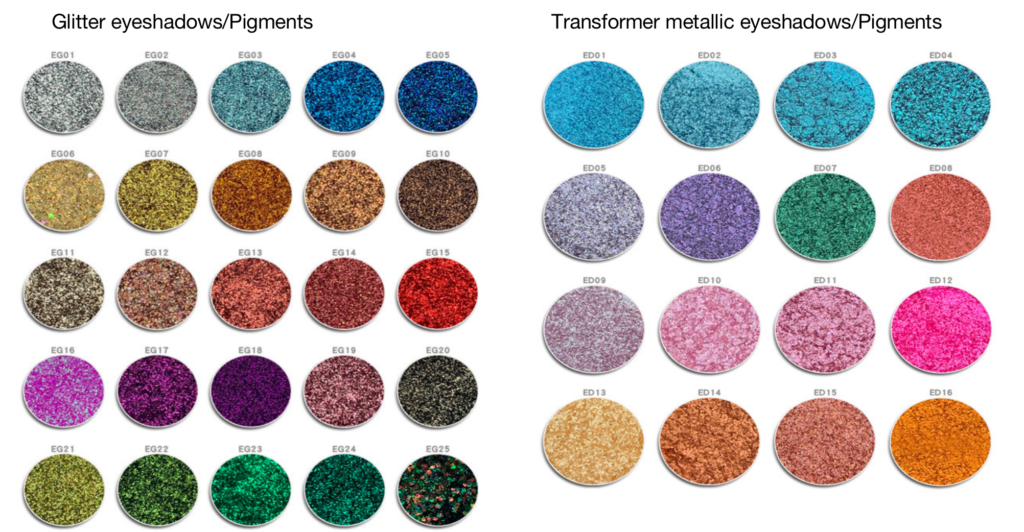
The private label supplier Metacnbeauty Private Label Cosmetics sells convenient sample eyeshadow like the one shown above. This 1 piece currently costs $2 , Total 170 pcs cost in $340 only.
If you attend an industry trade show, you can pick up loads of samples all at once and test samples on the show floor.
However you acquire samples, your next step is to thoroughly review each product to see if it meets your expectations and fits your beauty brand. Here, your opinion matters most, but getting input from others is also a good idea.
If you have a shop, spa, or set of clients, you can get them involved in trying different products to see what everyone likes. After all, they’re your potential buyers. If you don’t have an existing clientele to tap, gather some friends to try products and provide feedback.
It might take a few rounds of reviews and maybe even a few rounds of sample items from different suppliers, but eventually you’ll find a collection that defines your brand.
5.Decide How to Sell and Marketing Your Private Label Cosmetic Line
Before placing your initial order, you need to decide how you want to market and sell your private label cosmetics line. You can start small with one sales channel, add products to an existing shop, or set up multiple sales channels at once.
Popular channels for selling cosmetics include:
In-store: Sell cosmetics at a salon, spa, specialty fashion boutique, or natural foods shop using a point-of-sale (POS) system like Square.
Online through your own website: Create a website using an ecommerce platform like Shopify.
Amazon: Sell private label cosmetics on the Amazon Marketplace.
Social media: Sell products directly through a Facebook Shop, Instagram account, or on TikTok.
Markets: Become a vendor at local home, gift, and craft markets or community events with a mobile POS app.
Sell to other retailers: Because you are developing your own line, you can sell those products wholesale to boutiques, spas, and brick-and-mortar stores.
If you plan to sell primarily on Amazon, some private label cosmetics suppliers like Nardo’s Natural make the process easier by providing optimized packaging. If you use Fulfillment by Amazon (FBA) to store products and ship orders, it sends your items to Amazon for you, too. This is something to consider if Amazon sales are your main focus.
Even if you think you’ll sell primarily on Amazon or through social media, it’s still a good idea to consider launching your own e-commerce website. Your own site is the best place to build a brand identity and audience that’s uniquely yours and under your control. Diversifying your sales channels is a great way to grow your brand and sell more products.
6.Design Your Branding, Logo & Packaging
As you explore potential suppliers, you’ll find that most take care of the labeling and packaging process for you; you supply your logo design and they do the rest. This is the simplest way to label and package your private label cosmetics—it produces a professional look and ensures that your labels are correct (i.e., ingredient lists and other requirements).
Many suppliers also provide free images of your branded products.
Most cosmetics private label suppliers charge label printing and packaging fees on top of your product cost, so be aware of this during your research and planning. These fees are listed clearly on most supplier websites. If you have any questions, a call to the customer service line should clarify any packaging fees or process questions you have.
To get your logo on your products, most suppliers ask you to upload your logo with your order. Suppliers provide logo specifications, including the number of colors allowed, size restrictions, and file types.
If you don’t have the design skills to create your own logo, you can find budget-friendly artists to design a great logo on freelancer sites like Fiverr and Upwork.
If you don’t have a solid idea for your brand’s logo, head to Pinterest and search for private label cosmetics packaging for inspiration. You can also check out social media posts from graphic designers on Instagram or TikTok to get inspo from other brands..
7.Order Private Label Cosmetics
After you’ve selected your cosmetics private label supplier, decided which items you want to carry in your line, and designed your branding, you’re ready to place your first order. By this point, you likely have spoken with a customer service representative, so this step should be simple. Here are some things to note and double-check:
It are generally paid for upfront, so expect to pay via credit card when you place your order.
Make sure your product pricing and label printing fees are accurate.
Be aware of turnaround times required for the labeling process.
Understand that most cosmetics private label don’t accept returns.
Be aware of shelf life, temperature regulation requirements, and expiration dates for the items you’re selling.
In most cases, after your order is placed, you’ll have a few weeks until it arrives. Use this time to launch your website, set up on Amazon, and get your social media pages up and running—or work on your store or spa setup for your new beauty line display.
Challenges in Private Label Cosmetics
There are several challenges that private label cosmetic companies may face. Some of these challenges include:
Intense competition: The private label industry is extremely competitive .
Rising costs: The costs of production and materials can be high for cosmetic companies .
Stringent regulations: Private label cosmetic companies must comply with strict regulations and standards .
Changing consumer preferences: Consumer preferences and expectations can change rapidly, making it difficult for cosmetic companies to keep up .
Success Stories in Private Label Cosmetics
There are many success stories in the cosmetics private label industry. One example is Sephora Collection, which is a private label beauty business . Sephora Collection has made high-end beauty more accessible by offering a wide range of products at affordable prices . Another example is Nature’s Own Cosmetics, which has been manufacturing private label cosmetics for over 35 years and has a reputation for producing high-quality products And other brands like ColourPop, Morphe, and Kylie Cosmetics have become household names due to their innovative products, savvy marketing, and loyal customer base. These success stories serve as inspiration for aspiring private label entrepreneurs.
Conclusion
In conclusion, cosmetics private label offer many benefits to companies looking to enter the beauty industry. Private label cosmetics allow companies to create a recognizable brand identity and offer products at a lower cost than their branded counterparts. Private label cosmetics are made with quality ingredients and processes and can be tailored to a specific customer’s needs. However, there are also challenges that private label cosmetic companies may face, such as intense competition, rising costs, stringent regulations, and changing consumer preferences. Despite these challenges, there are many success stories in the private label cosmetics industry
FAQs
What are the startup costs for a private label cosmetic line?
The startup costs for a cosmetics private label line can vary depending on several factors. For example, starting your own skin care or makeup line can range from about $1,000 to $20,000 .Private label cosmetics samples cost $50 to $150 per company,
Upfront costs vary greatly depending on whether you’re starting a brand new business or adding a new product line to an existing business, as well as whether you’re storing product in-house or drop-shipping. If you’re starting a new business and either selling products in person or fulfilling customer orders in-house, startup costs will be a few thousand dollars for sample products, a website, initial wholesale order, and shipping.
The price depends on your initial order numbers, your select products, packaging and other elements such as logo and graphic design . It is important to ask your private label company about minimum order quantities
How can I ensure my private label cosmetic products are cruelty-free?
work with a manufacturer that has a cruelty-free certification or a policy against animal testing 1. You can also research the ingredients used in your products to ensure that they were not tested on animals . Additionally, you can look for cruelty-free certifications from organizations such as Leaping Bunny or PETA
Can I create a private label cosmetic line with organic and natural ingredients?
Yes, you can create a cosmetics private label line with organic and natural ingredients. Many private label manufacturers offer the option to use organic and natural ingredients in their formulations. When choosing a private label manufacturer, it is important to look for one that has experience working with organic and natural ingredients and can provide documentation to support their claims.
How long does it take to develop and launch a private label cosmetic line?
The timeline can vary depending on factors such as product development, packaging design, and lead times. It’s essential to plan accordingly and work with a manufacturer that can meet your desired timelines.
Do I need to trademark my private label cosmetic brand name?
Yes, it’s highly recommended to trademark your brand name to protect your intellectual property and prevent others from using a similar name. Registering a trademark can provide legal protection and help establish brand recognition.
At Last
In 2022, the revenue of the global cosmetics markets increased to 93.05 billion U.S. dollars. The Statista Consumer Market Outlook estimates that revenue will surpass 100 billion dollars by 2023 and by 2027 reach an annual revenue of around 124 billion U.S dollars.. Learning how to sell private label cosmetics is a simple and low-cost way to build your own beauty brand.
Entry costs to private label cosmetics sales are low, and the variety is so great that even fashion boutiques, healthy living brands, and active lifestyle businesses are expanding into this high-demand market. Once you’ve selected your supplier and products for your initial line, you need to design your logo, place your order, and plan your selling strategy.

